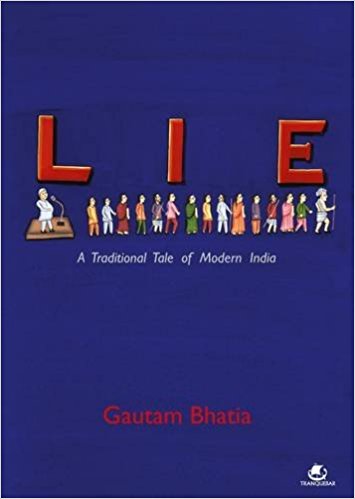Cynicism and hopelessness often tint our view of the political situation in our country and with news channels painting bleak pictures for us twenty-four hours a day, an almost existential sort of hopelessness tends to grip us from time to time. Lie, a graphic novel by Gautam Bhatia, sets out with the intention of being a satire on the increasingly dubious morals of our country, and the decadence which has set into our everyday life.However, instead of being a well-written dark comedy or a hard hitting satire, the novel ends up addressing situations and themes in a half-baked, superficial manner. The result is annoying and often one is tempted to skip a couple of pages so that the story moves ahead quickly.
The narrative is non-linear and often, characters launch into long stream of consciousness monologues that in the format of a graphic novel are difficult to read and follow. It is hard to gauge where we are headed or determine the point the author is trying to make. Characters change names and appearances, brand names are used blatantly, and women are portrayed rather disrespectfully, as either domestic doormats or scheming vamps.
The proceedings soon descend into chaos, with characters appearing and disappearing at will, a woman who goes into labour in the most unexpected of places, her mother- in-law, who finds the most macabre ways to dispose off the girls born to her, a prime minister who looks suspiciously like a powerful lady prime minister of the past, and a whole lot of other caricatures who keep finding something to say to slow down the novel to a crawl. In this mayhem, we have a character who seems to be a crossbreed between Mahatma Gandhi and Raju Guide. Alibaba, as he is inexplicably named, organizes marches and fasts for rain and political resolution. He is also one-dimensional like the other characters, however, this time it is his diabetic goodness that gets hard to comprehend.
The illustrations or graphics accompanying the novel are unable to improve the reading experience significantly. The effort seems half-hearted and amateurish, making the Amar Chitra Katha comics we grew up reading seem like classical works of art. The illustration of a couple copulating is the same one used to convey the molestation of a child. The lady prime minister is shown to conduct meetings while having a bath. Such insensitivity or chauvinism is simply unacceptable in this day and age when we are struggling to break stereotypes. The main problem with this book however lies in the author’s overwhelming negativity that forces him to paint the entire country in bold brush strokes of doom while leaving little spots of white for Mr Alibaba and his forty cronies who loiter around Rajpath, while he starves. The result is a patchy and badly composed work of art. It would be a ‘lie’ if the book is termed worth a dekho!

